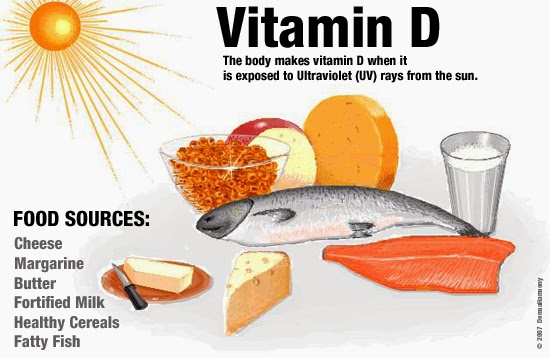Vitamin D is often referred to as the “sunshine vitamin” because it is the only vitamin that can be synthesized by our skin in the presence of sunlight. The inert form of Vitamin D is then converted to two active forms by the kidneys and liver so that it can be readily used by the body. During the summer our bodies will produce an adequate supply of vitamin D as we spend time outdoors. Since we don’t get as much exposure to sunlight during the winter months, it is important that we receive the daily requirement of this important vitamin through our diet.
Vitamin D plays many roles in the body. This vitamin in its bioactive form is responsible for:
- Promoting absorption of calcium which is needed for the growth and development of bones and teeth
- Promoting absorption of phosphorus in the body, which is needed for proper neuromuscular function
- Enhancing the immune system and therefore reducing the risk of infection and disease
- Reducing inflammation
- Regulating cell growth
- Maintaining good bowel and bladder health
Vitamin D deficiency is usually the result of lower than recommended intake levels, limited exposure to sunlight, or inadequate absorption by the body. Deficiency in Vitamin D can cause:
- Headaches
- Difficulty sleeping
- Muscle fatigue
- Muscle cramps
- Low immune function
- Rickets (soft bones and skeletal deformities) in infants & children
- Bone pain
- Joint pain or swelling
- Osteomalacia (abnormal weakening of bones) in adults
Those that are at risk of Vitamin D deficiency include:
- Exclusively breast-fed infants (breast milk alone does not meet the required daily intake)
- Elderly (aging skin does not effectively synthesize Vitamin D)
- Obese individuals (may need more Vitamin D than the average sized person)
- Those with limited sun exposure
- Those with coloured skin, especially dark skin (increased levels of skin pigmentation called melanin reduces the skins ability to produce Vitamin D)
- Those with conditions that result in fat-malabsorption
Those with limited exposure to sunlight need to supplement their diet with Vitamin D rich foods and supplements. Vitamin D is naturally present in some foods such as seafood, added to other foods such as fortified cereals, and is also available in supplement form.
Some good sources of Vitamin D include:
- Salmon
- Mackerel
- Tuna
- Sardines
- Beef liver
- Egg yolk
- Cheese
- Button and shitake mushrooms
- Fortified milk
- Yogurt
- Fortified margarine
- Soy milk
- Fortified cereals
- Fortified orange juice
- Fortified tofu
Exclusively breast-fed infants, the elderly, and those with limited exposure to sunlight should include a dietary supplement of Vitamin D in their diets. Infants and younger children are required a Vitamin D supplement of 400 IU daily and older children and adolescents can be given 600 IU daily. It is always best to ask your doctor before you start including a supplement in your diet.
I use Ddrops Kids during the winter months for both my children. One drop a day ensures that my children get their required daily intake of Vitamin D. To see my product review on Ddrops, see here.
As with any supplement it is important to follow the instructions and administer the correct dosage. Over-dosing for a prolonged period of time can result in Vitamin D toxicity which can lead to problems such as:
- Weight loss
- Anorexia
- Damage to the heart and blood vessels due to excessive levels of calcium in the blood
- Arrhythmia (Irregular heartbeat)
- Kidney damage
- Polyuria (excessive production and passage of urine)
Important things to NOTE:
- Sunlight is the best source of Vitamin D.
- 10-15min of direct exposure to sunlight provides the full recommended daily intake of Vitamin D.
- Wearing sunscreen with SPF inhibits the skin’s ability to produce Vitamin D.
- UV radiation is a carcinogen responsible for skin cancers and so exposure to sunlight without sunscreen should be limited.
- Contrary to popular belief Vitamin D cannot be synthesized while exposed to sunlight indoors or in a car, because the UVB radiation in sunlight cannot penetrate glass.
- Prolonged exposure of sunlight DOES NOT cause Vitamin D toxicity (the body only synthesizes the required amount to carry out body functions).
- Osteoporosis although associated with insufficient calcium intake can also result due to inadequate Vitamin D intake over a period of time. Vitamin D is required for calcium absorption.
- Research has shown Vitamin D plays a role in the prevention of colon, breast, and prostate cancers.
- Research has shown that Vitamin D plays a role in the prevention and possible treatment of diabetes, glucose intolerance, high blood pressure, multiple sclerosis and depression.
To learn more about Vitamin D, click here.
Feature Image: timesofmalta.com







Nice post
[…] Thank you to everyone that sent prayers and positive thoughts our way. If you have questions pertaining to this subject, please feel free to contact me. More information on Vitamin D and its role in your body can be found here. […]